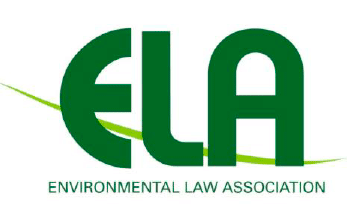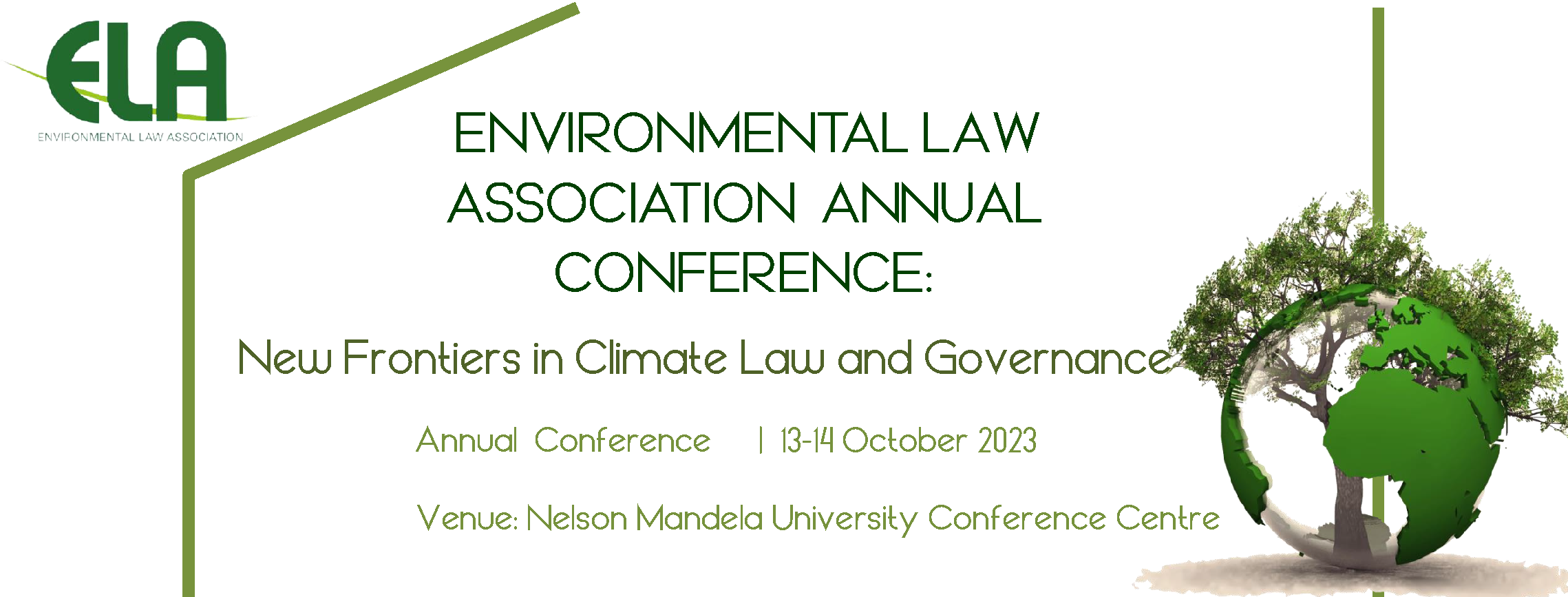The ELA Annual Conference: New Frontiers in Climate Law and Governance, 13-14 October 2023
Climate law and governance measures around the world are rapidly evolving. Climate action by civil society and the judiciary, legislature and executive is taking hold. Activism by the Climate Justice Charter Movement, new climate case law, the introduction of draft legislation such as the Climate Change Bill, and the activities of the Presidential Climate Commission are examples. Given the need to urgently mitigate GHG emissions, and to adapt to climate change impacts, presenters at the Environmental Law Association of South Africa’s 2023 Annual Conference grappled with the questions:
What are the new frontiers in law and governance aimed at addressing climate change in South Africa and beyond?
Do they go far enough?
What more needs to be done?
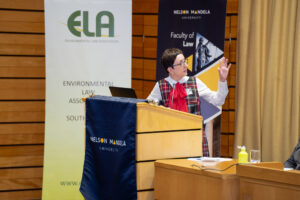
Prof. Anél Du Plessis, Stellenbosch University.
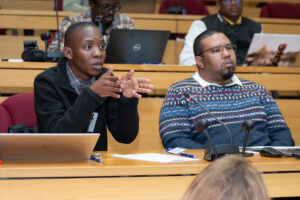
Student presenter, Cassius Lathlang, NWU, engaged in dialogue with presenters during the Annual Conference.
Our Annual Conference took place in person at Nelson Mandela University, Gqeberha, thanks to our host ELA Exco member, Tanya Wagenaar. The deadline for submission of abstracts was 1 Sept 2023.

Wonderful conference host, Dr Tanya Wagenaar, Nelson Mandela University.
Presenters engaged with the following:
The world is changing at a tremendous pace. Everyday new threats to Earth systems functioning come to the fore linked to climate change, including rapid biodiversity and habitat loss and emergencies in relation to health and extreme weather events. These threats undermine the pursuit of social, environmental, climate, and interspecies justice. Amidst the prevailing climate crisis, food, water, and energy security all over the world are imperiled, including in South Africa where inequality is rife.
Despite the urgent need to mitigate greenhouse gas emissions and pursue a just transition to renewable energy, geopolitics and the war in Ukraine have caused the emergence of new markets for oil and gas, found in Africa. At the same time, alternative technologies are being introduced to address the energy crisis, some of which are not tested. In this context, state actors have an important role to play in combating climate change and its many implications. Yet, gaps in the law and implementation failures (such as uneven or ineffective law enforcement) are hampering climate mitigation and adaptation efforts. Multinational corporations are also important role players who are increasingly expected to report on their environmental and social governance (ESG).
Countries all over the world are formulating new policies, laws, and governance measures to address the threats to humans and the environment due to climate change. Examples in South Africa include the Carbon Tax Act, the Climate Change Bill, and the Presidential Climate Commission’s Just Transition Framework. These measures represent ‘new frontiers’ in climate law and governance aimed at fulfilling the country’s commitments under the Paris Agreement. Against the background of a changing world in a time of climate crisis, this conference focuses on ‘New Frontiers in Climate Law and Governance’.
For instance, our keynote speaker, Judge Avinash Govindjee offered insightful analysis of the Constitutional Court’s December 2022 decision in Eskom Holdings SOC Ltd v Vaal River Development Association (Pty) Ltd and Others. Judge Govindjee reflected that the Constitutional Court missed an opportunity to embrace Murcott’s legal theory of transformative environmental constitutionalism and could have done more to reflect on ways in which the electricity crisis and environmental crisis intersect.
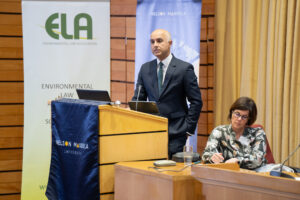
Keynote speaker, Judge Govindjee, Eastern Cape High Court.
Attending the Environmental Law Association 2023 conference, which was focused on climate change, placed what I have been learning into a practical context where I found myself strengthening the knowledge I have gained. It was comforting to see that several of the presenters were names that I recognised from literary sources used within the course. By further engaging with these scholars I believe it to have benefitted my ability to consolidate what I have learnt, and added to it in a meaningful way. I personally enjoyed connecting with the other students attending, and even being able to engage with some presenters. The conference opened my eyes to the future needs of environmental law regime which has now greatly informed my career decisions and interests. To anyone, student or not, I would recommend attending this annual conference as it is highly impactful. The issues of environmental degradation and climate change are ever-present, and in attending this conference my eyes have been further opened to the struggles that communities of all species are facing. Humans are the causes of these environmental issues, and thus need to be the change. I believe the ELA is one of our strongest local actors for change.
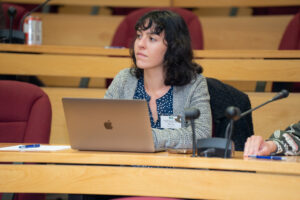
Nina Erhart, PG Diploma graduate, UCT.
The conference featured insightful presentations from leaders in the field of Environmental Law, including Prof. Tracy-Lynn Field, Prof. Willemien Du Plessis, Prof. Anél Du Plessis, Prof. Michael Kidd, Catherine Warburton, A/Prof. Melanie Murcott, A/Prof. Clive Vinti, and others.
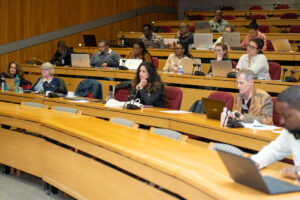
Practitioners, academics, students and others in attendance at the Annual Conference.
At the ELA’s Annual General Meeting, which took place during the conference, we sadly said goodbye to several long-serving Executive Committee members, including Prof. Willemien Du Plessis, the Secretariat, and Chairperson, Peter Kantor. Both have served the ELA for many years with grace, strength, and fortitude. A new Executive Committee was elected, and will be led by new Chairperson, A/Prof. Melanie Murcott, with new Vice Chairperson, Nicola Irving. Thanks to fantastic succession planning, the handover was smooth (though emotional), and the new leadership is committed to stepping into the large shoes of Peter, Willemien, and others who have led the ELA from strength to strength for many years.
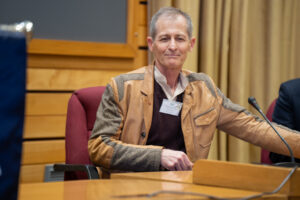
Long-serving Chairperson, Peter Kantor, who handed the baton to Melanie Murcott in 2023.

Incredible mentor and Secretariat of the ELA, Prof. Willemien Du Plessis, who passes on her role to Mikaella Bodeux.
Check out the conference programme:
ANNUAL ELA CONFERENCE PROGRAMME rev10
